- Digital Edition
- U.S. & World News
- Already/Not Yet
- Amid the Fray
- Ask Father Mike
- Bridging Faith
- Catholic — or Nothing
- Catholic Watchmen
- Echoes of Catholic Minnesota
- Everyday Mercies
- Faith at Home
- Faith Fundamentals
- Faith in the Public Arena
- Food from Scripture
- Inside the Capitol
- The Local Church
- Making Sense Out of Bioethics
- Simple Holiness
- Twenty Something
- Word on Fire
- Your Heart His Home
- From Readers
- Focus on Faith
- Sunday Scriptures
- Daily Scriptures
- Why I am Catholic
- Practicing Catholic
- Movie Reviews
- And the beautiful
- Video Game Reviews
- Local Events
- Classifieds
- Publication Dates


Before you go
Sign up for our free newsletter, visit the imprisoned.
To visit the imprisoned is a corporal work of mercy. Jesus mentioned it specifically when he said, “For I was . . . in prison and you visited me” (Mt 25:35, 36).
Jesus has mercy for “the least,” those despised by others. Convicts rank high among “the least.” For the general public, when a criminal gets prison time, the criminal is getting what is deserved; the criminal needs to pay for what has been done. Jesus understands the brokenness of those who have done hateful things. From the cross Jesus said, “Father, forgive them, they know not what they do” (Lk 23:34).
Jesus wants us to have compassion for those in jail or prison. Instead of having an attitude of anger, retribution, punishment or vengefulness, Jesus wants us to be merciful. We need to honestly acknowledge our own inclination to evildoing and admit, “There, except by the grace of God, go I.” Many of us are all lucky to be a “step ahead of the law,” because all of us have gotten away with something for which we deserve to be punished.
Inmates are real human beings. Prison time is hard time. It is lonely time. It is dangerous time. Prisoners need help, support, encouragement and prayers. And as Jesus explained, a visit is a great way to help a prisoner.
Visiting prisoners is not so easy these days. Security measures have been strengthened and access is restricted. A prisoner can place several names on an approved list of visitors, and volunteers can gain access to inmates only after training and background checks. So how can the average person perform the corporal work of mercy to visit the imprisoned?
If you know someone who is in prison, and if you are on the approved list of visitors, make every effort to go and visit the person. Your presence will be a great blessing.
Consider prison ministry. Ministries include prayer services, Bible studies, retreats, religious book clubs and pastoral visits. Step forward. Offer your services. Go through the orientation for jail volunteers. Submit to the background check. Embark on the corporal work of mercy of visiting the imprisoned.
Because security measures keep most people out of jails and prisons, there are spiritual things that the average person can do for those who are incarcerated. First and foremost, we can pray for those in prison. Pray that inmates, in their isolation, will know God’s constant presence and love. Pray for their safety in the face of danger. Pray for their conversion as they deal with their troubled past. And, as they deal with separation from family and friends, pray that they will receive forgiveness, a second chance and continuing support.
We can turn to St. Dismas, the criminal who was crucified next to Jesus (Lk 23:40-43), the “good thief” and the patron saint of inmates, to intercede on behalf of those who are in prison. We can also turn to St. Barbara, the other patron saint of inmates, and St. John Cafasso, the patron saint of prisons, who served prisoners, heard their confessions, granted them absolution and accompanied them on their way to the gallows. We can also work to abolish capital punishment, support halfway houses, correspond with prisoners, assist the families of those who have someone in prison, and support parish and diocesan ministries to the incarcerated.
Father Van Sloun is pastor of St. Bartholomew in Wayzata.
Related Articles
Angels among us: how helping leads to healing, admonish the sinner, delano deacon devotes decades to digging graves as he prays for those laid to rest, pray and work.
ARCHDIOCESAN SYNOD 2022 ARCHDIOCESE OF ST. PAUL & MPLS.
Contact us: [email protected]
777 Forest St., St. Paul, MN 55106 © 2022 TheCatholicSpirit.com. All rights reserved.

The seven Corporal Works of Mercy are listed below. After each work of mercy there are also suggestions and words of advice for living them out in our daily lives. Have your own suggestions? Let us know @USCCB and use the hashtag #mercyinmotion .
Feed the hungry
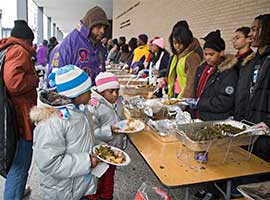
- Having delicious food at Thanksgiving or Christmas dinner? Donate to a Thanksgiving or Christmas food drive so everyone can have something to eat.
- Research, identify and contribute financially to organizations that serve the hungry.
- The next time you make a recipe that can be easily frozen, make a double batch and donate one to your local food pantry or soup kitchen.
- Try not to purchase more food than you are able to eat. If you notice that you end up throwing groceries away each week, purchasing less groceries would eliminate waste and allow you to donate the savings to those in need.
Give Drink to the thirsty
Many of our brothers and sisters in Christ do not have access to clean water and suffer from the lack of this basic necessity. We should support the efforts of those working towards greater accessibility of this essential resource.
- We take it for granted that we have access to clean water. Donate to help build wells for water for those in need
- Organize a group of children involved on a sports team (e.g. soccer) or a summer camp. Invite them to collect bottled water to distribute at a shelter for families. If parents can be involved, ask them to accompany their children in delivering the water to the families.
- Do the same for youth and young adult groups.
- Make an effort not to waste water. Remembering to turn off the water faucet when you are brushing your teeth or washing dishes can help, especially in regions suffering from drought.
Shelter the homeless
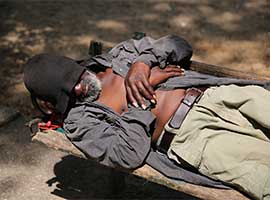
- See if your parish or diocese is involved with a local homeless shelter and volunteer some time.
- Donate time or money to organizations that build homes for those who need shelter.
- Many homeless shelters need warm blankets for their beds. If you can knit or sew that would be an extra loving gift.
- There are millions of children and families who are on the move, fleeing from war, illness, hunger and impossible living conditions, and searching for peace and safety. Engage parish groups of children, youth, young adults, and families in doing some research on the causes and challenges that these families face to survive. Contact Catholic Social Services, or diocesan offices of peace and justice for help with your research. Seek ways to provide shelter for the homeless locally, regionally, nationally or internationally.
visit the sick
Those who are sick are often forgotten or avoided. In spite of their illness, these individuals still have much to offer to those who take the time to visit and comfort them.
- Spend time volunteering at a nursing home – Get creative and make use of your talents (e.g. sing, read, paint, call Bingo, etc.)!
- Take time on a Saturday to stop and visit with an elderly neighbor.
- Offer to assist caregivers of chronically sick family members on a one-time or periodic basis. Give caregivers time off from their caregiving responsibilities so they can rest, complete personal chores, or enjoy a relaxing break.
- Next time you make a meal that can be easily frozen, make a double batch and give it to a family in your parish who has a sick loved one.
visit the prisoners
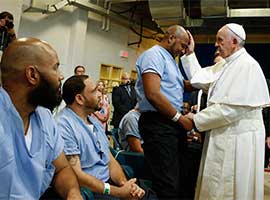
- See if your parish, or a nearby parish, has a prison ministry and if so, get involved.
- Volunteer to help out or donate to charities that give Christmas presents to children whose parents are in prison.
bury the dead
Funerals give us the opportunity to grieve and show others support during difficult times. Through our prayers and actions during these times we show our respect for life, which is always a gift from God, and comfort to those who mourn.
- Send a card to someone who has recently lost a loved one. Make your own card and use some of these prayers .
- Visit the cemetery and pray for those you have lost.
- Spend time planning your own funeral mass, read through the Order of Christian Funerals and find our hope in the Resurrection.
give alms to the poor
Donate money to organizations that have the ability to provide support and services for those in need. Do research and find organizations that put people in need first, rather than profit.
- Skip the morning latte and put that money in the collection basket at church.
- Find a charity that is meaningful to you and volunteer your time or donate.
- This Lent, give up eating out at restaurants. Pack you meals and donate the extra money to charities.
- Participate in CRS Rice Bowl

- Bishop Kettler's Column
- Bishop Neary's Column
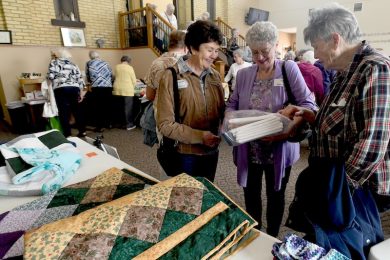
Maryknoll priest explores the meaning of mission at annual rally

Second car raffle for vocations set for May 20

Upcoming local events

Pope Francis appoints first Catholic bishop with Anglican heritage for UK ordinariate
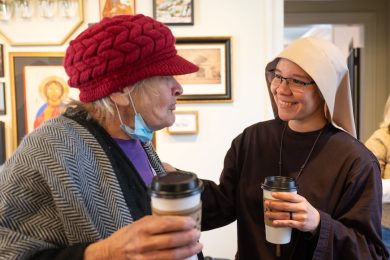
New cafe at basilica in Baltimore is designed to encounter the poor

Photos of the week May 3, 2024
- Faith in the Public Arena
- From the Editor

Christina Capecchi: Stop scrolling, start creating: a wake-up call for Catholics

A Catholic convert can help us love Mary more

No, Richard Dawkins, cultural Christianity is not enough
- Ask Father Tom
- Food for the Journey | Fr. Ron Rolheiser
- Igniting our Faith | Bishop Robert Barron
- In Light of Faith
- In the know with Father Joe
- Marriage Matters
- Parenting Journey
- Question Corner | Fr. Kenneth Doyle
- Sunday Scripture Readings
- Thanksgiving
- Theology 101

OSV Kids May 2024

Mary, full of grace

Father Ron Rolheiser: Civility Has Left the Building
- Book Reviews
- Movie Reviews
- Video Game Reviews

Catholic evangelists ask NFL fans visiting Detroit to make Jesus their No. 1 draft pick

‘Tortured Poet’ Taylor Swift offers troubled tales of our time

Sister best known for ministry to migrant shares her artwork that tells their stories
- Catholic Social Teaching
- Eucharistic Revival
- Bishop Kettler's Pastoral Letter
- El Visitante
- Laudato Si Study Session
- Melrose Church Fire
- Pastoral Planning
- Safe Environment Articles
- The 7 Sacraments
- YAYA Awards
OSV Kids / OSV para niños – Mayo 2024

6 things you need to know about the second round of Synod listening

Father Ron Rolheiser: Reindeer Games

Del Obispo Patrick Neary: María nos envuelve a todos en su compasión y amor

Cardenal: La vocación es una llamada a la felicidad; el camino correcto se discierne en la oración
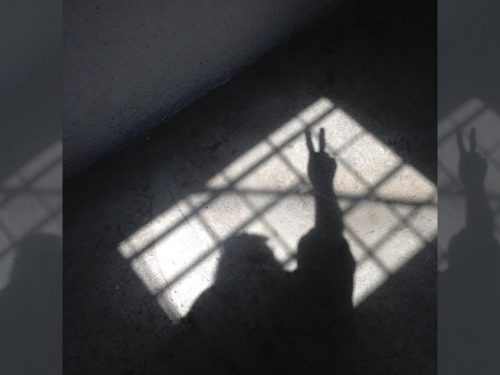
- Special Sections
- Year of Mercy
- YOM Online Lessons
Visit the Imprisoned
Online Lesson: These online lessons may be used: • by individuals anytime, anywhere. • in group settings — families, faith sharing groups, faith formation programs, and schools. • in “flipped” classroom situations for people to view before meeting face to face. You may just want to use a suggested video, story, or question — in anyway that helps us recognize that God’s mercy is anytime, anywhere, and we are called to be merciful as well. The structure of the lesson is based on Msgr. Francis Kelly’s Ecclesial Method .
Step 1 – Preparation: Each lesson will begin with a video and prayer to help us focus on the Works of Mercy in General.
Works of Mercy Reflection:
Merciful God,
You have created us to love You with all our heart, with all our soul, and with all our mind and to love our neighbor as ourselves . Yet we are often imprisoned in some way that prevents us from being as loving as we should be. Keep us mindful of those of us who are imprisoned physically, spiritually and psychologically. Give us the strength to reach out to those who are shackled in some way, and the courage to be open to those who call us to a freedom from our own bonds.
Step 2 – Proclamation: Each lesson will repeat the Works of Mercy to help us remember them.
The Spiritual Works of Mercy :
The Spiritual Works of mercy are acts of compassion, as listed below, by which we help our neighbors with their emotional and spiritual needs.
Counsel the doubtful Instruct the ignorant Admonish sinners Comfort the afflicted Forgive all offenses/injury Bear wrongs patiently Pray for the living and the dead
The Corporal Works of Mercy :
The Corporal Works of mercy are these kind acts by which we help our neighbors with their material and physical needs.
Shelter the homeless/Welcome the stranger Feed the hungry Give drink to the thirsty Clothe the naked Visit the sick Visit the imprisoned Bury the dead
Step 3 – Explanation: This step will address a specific Work of Mercy.
This Month: Visit the Imprisoned
All of the Works of Mercy boil down to this: “Beloved, if God so loved us, we also must love one another. (1 Jn 4:11)”
The Works of Mercy provide ways in which we can love better. The common theme throughout them is the continuance of our journey from self-centeredness to other-centeredness. The Reign of God is made more present as we are more attentive to others in their needs.
Visiting the Literally Imprisoned
Visiting the Imprisoned is a very challenging work in our culture. Below we will explore imprisonment metaphorically, but literal imprisonment deserves attention as well. In his blog, As I See It , Msgr. Vincent Rush posts:
This Holy Work has changed its meaning over time. The first Christians were, as you know, outlaws; so it was expected that some of their number would be in prison at any given time. Jesus was a prisoner; Paul was; Peter was; and many of the saints, bishops, and teachers of the first few centuries of Christian life were. So free Christians took it upon themselves to visit their friends, bringing food, solace, encouragement, and when possible liberation. They also sought the prisoners’ blessing, since to be imprisoned for being a Christian was a mark of great courage and faith. These days things are different, at least in our part of the world. (Christians continue to be imprisoned and even executed for their faith in the Middle East, in China, in Pakistan, in North Korea and in other countries.) People in prison are there as the result of a judgment by a criminal-justice system that, while by no means perfect, does make them different from the Christian prisoners of Jesus’ day. And modern prisons are not, by and large, visit-able places. So how are we to understand this Holy Work today? We might start by remembering that even the prisoner guilty of the most awful crime is still created in God’s image and is loved by God no less than God loves you or me. -Fr. Vincent Rush The Corporal Works of Mercy (4): To Visit the Imprisoned
Nothing helps us understand someone else better than a story. Karen Imholte shares a little of her story as an educator in the prison system, and a little bit of a story of one of her students. With a little tough love, Karen (and his Grandmother) empowered him to take a college level course that changed his life.
Along with the protection of society from truly dangerous individuals, one goal of imprisonment should always be rehabilitation so that the “lost” can be “found” and restored to a right relationship with God and others. But this costs money – for addiction treatment, for education, and for other aids to rehabilitation that are too-easily disposed of in times of budget cuts. And these programs do serve both society and prisoners – a recent study from California showed that both incarceration rates and crime dropped as rehabilitation increased. [1] -Fr. Vincent Rush The Corporal Works of Mercy (4): To Visit the Imprisoned
We are all victims of the deeds of criminals, even if it is just the climate of fear we experience when humans are violated. But how are we engaged with initiatives that make crime less likely to happen? This is a case where we cannot really change anyone but ourselves. How do we change ourselves and our system to affect positive change in others? Can we, in a sense, walk with ‘criminals’ by being proactively engaged in activities that prevent their crimes from ever happening in the first place?
Educating ourselves about the facts of imprisonment in the U.S. is a good step. Again from Fr. Vin:
The population of state and federal prisons grew by over 600% between 1972 and 1998; We imprison only a slightly lower proportion of our population than Russia, which has the highest rate in the world (we’re #2); Half of all inmates are African-American; one out of every three young African-American males is in prison, on probation, or on parole; Between 1970 and 1996 the number of women in U.S. prisons grew from about 5,600 to almost 75,000, a thirteenfold increase; most of these women were arrested for nonviolent crimes. [2] The U.S. bishops have called for reform. Their analysis and proposals are available on the web [note: their section on mission is digested below] . [3] We have to be careful not to allow our thinking about prison and prisoners (when we think about them at all) to be influenced by scaremongering to win votes (a not-unknown political phenomenon). -Fr. Vincent Rush The Corporal Works of Mercy (4): To Visit the Imprisoned
The analysis and proposals of the U.S. Bishops includes a section on the mission of the Church. How are we sent forth to address and act on this issue? Here is an encapsulation:
1. Teach right from wrong, respect for life and the law, forgiveness and mercy
“. … Catholic institutions that offer programs for youth and young adult ministry—including Catholic schools, Catholic Charities, and St. Vincent De Paul agencies—are bulwarks against crime, by providing formation for young people, enrichment and training for parents, counseling and alternatives for troubled children and families, and rehabilitative services for former inmates. ”
2. Stand with victims and their families
“. …Pastors and parish ministers must be prepared to respond quickly and effectively.
3. Reach out to offenders and their families, advocate for more treatment, and provide for the pastoral needs of all involved
“. … We know that faith has a transforming effect on all our lives. Therefore, rehabilitation and restoration must include the spiritual dimension of healing and hope. ”
4. Build community
“. … The Catholic Campaign for Human Development supports many creative efforts to prevent crime and rebuild community. ”
5. Advocate policies that help reduce violence, protect the innocent, involve the victims, and offer real alternatives to crime
“. … We must advocate on behalf of those most vulnerable to crime (the young and the elderly), ensure community safety, and attack the leading contributors to crime, which include the breakdown of family life, poverty, the proliferation of handguns, drug and alcohol addiction, and the pervasive culture of violence.”
6. Organize diocesan and state consultations
“. … We encourage diocesan leaders to convene similar processes of engagement and dialogue with those involved in the system: crime victims, former inmates, jail chaplains, judges, police officers, community leaders, prosecutors, families of victims and offenders, and others.”
7. Work for new approaches
“. … We also hope many others will join with them in efforts to prevent crime, reach out to victims, offer ministry and rehabilitation in our prisons, help to re-integrate ex-offenders, and advocate for new approaches.”
Visiting the Metaphorically Imprisoned
Fr. Vin concludes:
We can also extend the meaning of the Holy Work to consider those who are imprisoned metaphorically in other places: the elderly isolated in nursing-homes (or their own homes); people imprisoned by their addictions or their fears or their ignorance; people imprisoned by others’ views of them (immigrants, non-English speakers, people with disabilities…) The Holy Work of visiting the imprisoned can be as simple as a welcome that breaks down the wall of mistrust. That, each of us has opportunities to do every day. Until next week, peace Fr. Vin Rush Pastor’s Parish Blog “ As I See It “
Although the concept of using “visiting the imprisoned” as a metaphor is probably more comfortable to many of us than the issue literally taken, the challenges are formidable indeed. It is as simple… and as deep and demanding… as love. It is about making present the Reign of God that Jesus proclaimed. And he knew what it took.
Step 4 – Application and Appropriation into Life is the bridge between head knowledge and daily living as a disciple of Christ.
Faith in Action:
How do we reflect God’s love to those in prison? One formal initiative taken on locally is the Central Minnesota Residents Encounter Christ (REC) effort. It is a three part retreat over two days that invites participants to die with Christ, rise with Christ, and go forth to spread the Good News.
Reflection Questions:
Have you, or someone you know, ever spent time in prison? What did “visiting the imprisoned” mean at that time?
List some ways people are metaphorically imprisoned. What does “visiting the imprisoned” mean in those cases?
What are proactive ways we can change ourselves, and therefore our society, to prevent imprisonment from happening?
Suggested Activities (add your suggestions below):
- Call your local jail/prison to ask if it is appropriate to donate some Bibles to inmates. Ask about creating bookmarks with verses of encouragement.
Parish and School:
- Study statistics about the relationship between poverty and both literal and metaphorical imprisonment. Pray specifically for the imprisoned and their families as your students work on your next clothing, food or toy drive.
Step 5 – Celebration: Lessons will close with a prayer, silent or communally, that gives glory to God.
Closing Prayer:
Tender God,
You have created all of us in Your image, even those who are at the margins of society. Give us Your Spirit of Love that, as a Communion, we will create a culture in which no one would choose a path leading to imprisonment. Give us Your Spirit of Courage to find ways of walking with others, even outside of our comfort zones. Remind us that, in helping to make Your kingdom present, we must attend to those who are vulnerable in many ways as we pray the words Your Son gave to us:
Our Father, who art in heaven, hallowed be Thy name; Thy kingdom come; Thy will be done on earth as it is in heaven. Give us this day our daily bread;
and forgive us our trespasses as we forgive those who trespass against us;
and lead us not into temptation, but deliver us from evil. Amen.
In the “Leave a Reply” area below, please suggest another activity people could do to address this Work of Mercy , share a story about someone who visits the imprisoned, or write your own prayer for people in such need.
Author: Kristi Anderson
Kristi Anderson is the editor of The Central Minnesota Catholic Magazine for the Diocese of St. Cloud.
Leave a Reply Cancel reply
Save my name, email, and website in this browser for the next time I comment.
EWTN News, Inc. is the world’s largest Catholic news organization, comprised of television, radio, print and digital media outlets, dedicated to reporting the truth in light of the Gospel and the Catholic Church.
- National Catholic Register
- News Agencies
- Catholic News Agency
- CNA Deutsch
- ACI Afrique
- ACI Digital
- Digital Media
- ChurchPOP Español
- ChurchPOP Italiano
- ChurchPOP Português
- EWTN News Indepth
- EWTN News Nightly
- EWTN Noticias
- EWTN Pro-life Weekly
- Register Radio
Get HALF OFF the Register!
National Catholic Register News https://www.ncregister.com/blog/6th-corporal-work-of-mercy-visit-the-imprisoned

- Synod on Synodality
- Most Popular
- Publisher’s Note
- College Guide
- Commentaries
- Culture of Life
- Arts & Entertainment
- Publisher's Note
- Letters to the Editor
- Support the Register
- Print subscriptions
- E-Newsletter Sign-up
- EWTN Religious Catalogue
6th Corporal Work of Mercy: Visit the Imprisoned

The next corporal work of mercy includes two separate acts: “ransoming the captive” and “visiting the imprisoned.” For the purposes of this article we will look at “visiting the imprisoned” as that is a bit more accessible for the average person.
In my last article we looked at a recent pope, John Paul II, and his practice of “visiting the sick.” This week I decided to continue that trend and look at another recent pope who has made this work of mercy (visiting the imprisoned) a hallmark of his pontificate. As you may have guessed, it is none other than Pope Francis.
Loving Without Limits
It has become routine for Pope Francis to visit those in prison. On Holy Thursday he makes it a priority to celebrate Mass at a local prison, going so far as to wash the feet of the inmates there. This is not something new for Pope Francis, as he often visited the imprisoned as a bishop.
Even during his apostolic trips outside of Rome, Pope Francis has made it a part of his schedule to visit prisons. When he visited Philadelphia he stopped at the Curran-Fromhold Correctional Facility , gave a short sermon and shook hands with inmates.
During one of his recent homilies on Holy Thursday, Pope Francis addressed the prisoners and said:
“Jesus loves us, without limits, always, until the end. The love of God for us doesn't have limits. There is always more, always more. He never tires of loving anyone.”
It is clear that Pope Francis’ mission is to show to these souls that God still loves them and beckons them to reform their ways. Pope Francis is reaching out to these men and women who have made many bad choices in their life and is trying to instill hope in their hearts.
It is easy for prisoners to lose hope and turn inward upon themselves. They believe that they can never be “good” or break the cycle of sin. For many of them, it appears that God has abandoned them and does not know of their suffering.
Pope Francis realizes this state of mind and takes care not to forget these men and women, who are so often neglected. He reminds us that they have souls too and deserve our time and attention.
Prison ministry is a beautiful way of participating in this work of mercy, but is certainly not for everyone. It takes “tough skin” to encounter prisoners and is not easy. This does not mean we should not carefully discern if God is calling us to visit the imprisoned. It is very much needed in today’s world, especially in this year of Mercy.
Another way that we can participate in this work of mercy is to imitate Saint Thérèse of Lisieux. Before she entered the convent Saint Thérèse learned about a criminal sentenced to death and decided to fervently pray for his conversion. Here is how she describes it in Story of a Soul :
“Just then I heard much talk of a notorious criminal, Pranzini, who was sentenced to death for several shocking murders, and, as he was quite impenitent…How I longed to avert this irreparable calamity! In order to do so I employed all the spiritual means I could think of, and, knowing that my own efforts were unavailing, I offered for his pardon the infinite merits of Our Savior and the treasures of Holy Church…I said in all simplicity: ‘My God, I am quite sure that Thou wilt pardon this unhappy Pranzini. I should still think so if he did not confess his sins or give any sign of sorrow, because I have such confidence in Thy unbounded Mercy; but this is my first sinner, and therefore I beg for just one sign of repentance to reassure me.’ My prayer was granted to the letter…The day after his execution I hastily opened the paper, La Croix, and what did I see? … Pranzini had mounted the scaffold without confessing or receiving absolution, and the executioners were already dragging him towards the fatal block, when all at once, apparently in answer to a sudden inspiration, he turned round, seized the crucifix which the Priest was offering to him, and kissed Our Lord's Sacred Wounds three times.”
We must not forget the imprisoned or treat them like refuse to be thrown away. God loves them and He desires their salvation. Let us discern in this year of Mercy how we can practice this much needed corporal work of mercy.
Philip Kosloski Philip Kosloski graduated from the University of Saint Thomas in Minnesota with a Bachelor’s in Philosophy and Catholic Studies and completed his Master of Arts degree in Theology with the Augustine Institute. He is a writer and author of In the Footsteps of a Saint: John Paul II's Visit to Wisconsin . He blogs at philipkosloski.com and writes to help all Catholics master the art of prayer by conquering the practical obstacles that prevent a fruitful relationship with Christ.
- Related Stories
- Latest News

Shocker: 72% of Catholics Don’t Go to Sunday Mass?
‘The Sunday Eucharist is the foundation and confirmation of all Christian practice. ... Those who deliberately fail in this obligation commit a grave sin.’ (CCC 2181)

Gifts for New (and Seasoned) Mothers
Thoughtful, Faith-Based Presents to Celebrate Mom

‘Natural Plan’ — New Couple to Couple League Video Series
The 10 video modules are supported by bonus videos, activities, guidebooks and other resources.

First Arab Christian Woman to Lead Israel’s University of Haifa
When Maroun arrived at the university, she didn’t know a word of Hebrew — Arabs and Jews have a separate education system — and she barely spoke English.

Mother Mary Lange and Other Black Heroines of the Faith
Elizabeth Clarisse Lange entered religious life and lived to be more than 90 years old, dying in 1882.

The Dynamic Interplay Between Liturgy and Personal Prayer, The Secret of Sinners and Saints, and More Great Links!
The Best In Catholic Blogging
Leah Darrow’s Newborn Baby Needs Our Prayers
Pope francis’ letter to parish priests: repairing rifts, grounding vision, and cultivating fraternity, ‘wildcat’: too much darkness, too little grace, class of ’24: commencement speakers range from ‘the chosen’ actor to cardinals, chicago priest blesses same-sex ‘spouses,’ says fiducia supplicans allows it, nagasaki’s continuous martyrdom: from the hidden church to the atomic bomb, science provides the new ‘5 ways’ for the existence of god, what is causing our fertility crisis catholic experts weigh in, when abortion zealotry and hostility to conscience collide, 2 notable catholics evangelize on twitter/x, subscription options.

Subscriber Service Center Already a subscriber? Renew or manage your subscription here .
Subscribe and Save HALF OFF! Start your Register subscription today.
Give a Gift Subscription Bless friends, family or clergy with a gift of the Register.
Order Bulk Subscriptions Get a discount on 6 or more copies sent to your parish, organization or school.
Sign-up for E-Newsletter Get Register Updates sent daily or weeklyto your inbox.

Sixth corporal work of mercy: Visiting the imprisoned
God calls the faithful to show mercy to those physically, mentally in prison.
By Marge Fenelon Catholic News Service
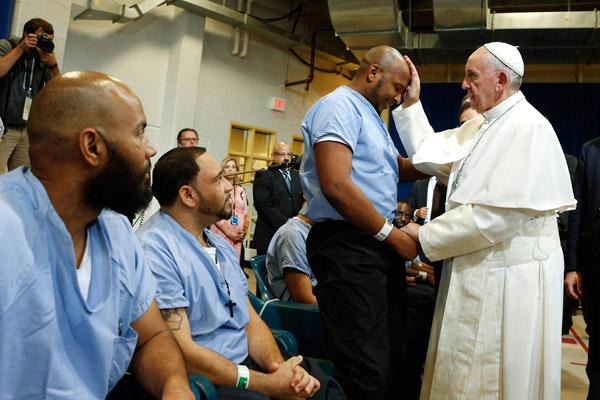
During this Year of Mercy instituted by Pope Francis, we’re called to become extensions of God’s mercy to others, particularly through the spiritual and corporal works of mercy — acts of charity and love toward others.
But one corporal work of mercy may prove a bit more challenging to carry out — visiting the imprisoned. How are we supposed to visit the imprisoned?
No doubt, it’s important to visit prisoners. They need and deserve Christian love and charity as much as anyone else. But there are different ways to be imprisoned. Just as there are physical bars that keep us locked in, there are mental, emotional and spiritual walls that keep us locked in as well.
Fears, anxiety, depression and hopelessness are all “prisons” that hold us captive, keeping us from feeling the love of God. They cage us in, stopping us from becoming children of God and from becoming the person he intended us to be. We may not have committed a crime per se, but we are incarcerated just the same.
Our Lord had compassion for those imprisoned by invisible walls as well as those imprisoned by real walls. There are numerous examples in Scripture, but the one that comes to mind is the story of the Gerasene demoniac (Mark 5:1-20) cured of his affliction and released from his cell by Jesus.
Jesus and his disciples had crossed the Sea of Galilee and entered Gerasa. There, he found a man who had long been tormented by demons and lived among the tombs. No manner of restraint could keep him from causing harm to himself or to others. The people of Gerasa feared him.
Amid the man’s shrieks, Jesus commanded the demons to leave him. At their request, Jesus sent the demons into a nearby swineherd. The swine then ran to the edge of a high cliff and jumped off, falling into the water and drowning. Only then, the man was again in his right mind and made capable of living a normal, productive life.
The Gerasene man had been imprisoned by demons, kept in a jail of torment that prohibited him from living a life of love and fruitfulness with family and friends. Jesus visited him in this prison, so to speak, by seeing him, not as he was, but as he could and should be: a free and joyful child of God.
So, too, should we see and help those who are imprisoned by a variety of walls. We should see them, not as they are, but for what they should and can be: free and joyful children of God. They need us to visit them in their prisons and to minister to them with compassion.
We may not be able to cure them of their torment, as Jesus did with the Gerasene man, but we can be for them a reflection of the light in their darkness.
Please read our Comments Policy before posting.

Related Articles
Current news, news & views from you, from the bishop.
Join Us on Facebook | Follow Us on Twitter | Privacy and Terms of Use | View and Buy Photos | Advertise | About Us
© 2024 Arkansas Catholic | 2500 N. Tyler St., Little Rock, AR 72207 | (501) 664-0125

- Ministry Resources

Charity, Justice, and Mass Incarceration: How Visiting the Imprisoned Changed Me

Some things didn’t surprise me during my first visit to a state correctional facility in 2011. When I got involved with Partakers , a College Behind Bars mentoring program that pairs volunteers with incarcerated men and women working on a college degree, the program coordinator gave me plenty of advice: Leave your jewelry at home — you’re not going to like the look of the lockers. Wear a sports bra — the metal detectors are on steroids, and if they go off, you’re going home. And don’t make any plans for the rest of the day — the lines move at a snail’s pace.
Other aspects of my first visit defied expectations. Hollywood had led me to believe that I’d meet Tom, to whom I’d introduced myself via letter, in a visiting booth with a glass partition separating the two of us and that he’d be wearing an orange jumpsuit. Instead, all visitors gathered in a large, open room where we were met by men in blue jeans and white T-shirts. Tom greeted me with a warm, firm handshake, which was another surprise. I didn’t think that physical touch would be permitted, so I didn’t anticipate the messages silently conveyed in Tom’s confident, yet gentle, grip.
Though I don’t recall what exactly I expected of Tom, I clearly remember the sting of self-reproach as I was surprised by his handshake. Shame on me for having preconceived notions about a person I didn’t know merely because he was incarcerated. This was the first of many moments that I was stretched and grew through my relationship with Tom.
RELATED: Comfort the Mourning: 5 Tips for Writing a Meaningful Sympathy Note
Moments of encounter with another can be personally transformative, and that is one of the greatest blessings of putting the Corporal Works of Mercy — seven instructions based on the teachings of Jesus — into action. The works offer a clear path to honoring the dignity of all people, and they open us up to experiencing our shared humanity with our hungry, thirsty, sick, marginalized, vulnerable, and incarcerated brothers and sisters.
Like all the works of mercy, there are many ways to put visiting the imprisoned into action. Here are just a few:
Visit someone in prison
Numerous organizations coordinate relationships between volunteers and people behind bars. Pen America and Prison Fellowship are two examples, but a quick Google search will uncover other nonprofits in your area. Or find out if your church or diocese has a prison ministry . Alternatively, consider your own social networks: Do you know anyone, or do you know anyone who knows anyone, who is in jail or prison? If you worry that your visit may be unwelcome, send a letter of inquiry first.
Become a pen pal
If visiting isn’t possible, consider developing a pen pal relationship. Many people in prison, especially those on death row, have minimal contact with the outside world, and letters provide both longed-for news and human connection. Like visiting, you might start by writing to someone from your social network, or you can use a program like the Death Row Support Project to get connected. Before writing, visit the prison or jail’s website to read their rules and procedures, and also check out Mary Catherine Johnson’s tip sheet for letter writing. Although Johnson writes about her experience corresponding with someone on Georgia’s death row, she includes excellent general advice that is universally helpful.
RELATED: Catholic Social Teaching and Reducing Food Waste
Be part of criminal justice reform
You can also get involved with one of the many nonprofits working to reform our country’s broken criminal justice system through programming and advocacy. This could mean anything from offering financial support to filling numerous volunteer needs to getting the word out about the organization. Maybe you decide to host a book drive at your church for the Prison Book Program , knowing that education is proven to reduce recidivism rates . Or sign up to meet a newly released man or woman at the prison gates through the Ride Home Program with the knowledge that release can be an overwhelming and frightening time for the formerly incarcerated, and that they are at the highest risk for recidivism in their early days of freedom. Or answer hotline calls or fundraise for Freedom for Immigrants , an organization devoted to abolishing immigration detention. Any of these organizations would benefit from your time, talent, treasure, and dedication to honoring the humanity of people behind bars.
I’ve heard it said that charity and justice are the two feet of love in action : Charitable works respond to immediate needs and social justice addresses systemic, root causes of problems. I would contend that charity and justice are the caterpillar and butterfly of living out the Gospel message. Encounter with another through the Corporal Works of Mercy gives birth to personal transformation and a renewed hunger for justice. A desire to live charitably led me to Tom, and in turn, Tom led me to be challenged and changed. While I no longer visit Tom – he graduated from the program, and I moved away – I know that his graduation didn’t lead to his parole. My care for Tom and the 2.2 million others suffering under the weight of mass incarceration impacts my prayers, my decisions in the voting booth, how I talk about people behind bars, and my choices about charitable giving. Our encounter instilled in me a conviction that I must play a part in working for justice for all members of our shared humanity.
Have you joined our mailing list yet?
Sign up for weekly updates from Busted Halo!
- CM Hangouts
- Explore all stories
- Daily Prayers
- Sunday Gospel Activities
To Visit the Imprisoned
Sep 26, 2016 12:00:39 PM | by Roxane Salonen
It's a corporal work of mercy that, so often in my life, I've opted to sort of skirt around. I'm a mother, after all, and this means vigilance when it comes to my family. And so the thought of visiting the imprisoned has seemed something to avoid.
And yet, lately, God has very directly been tapping me. "Don't be so quick to bypass this one," I hear him saying.
So many things have gone into play which bear reflection and discernment. It started with a local woman who is passionate about a ministry our county has adapted called Jail Chaplains. My sister also has been involved in a similar ministry in her city in the central part of the state.
And then came the Jubilee Year of Mercy. While giving a talk on mercy, I welcomed comments from a priest, who shared about his involvement in Jail Chaplains. He spoke with such conviction that my heart began to expand, and wonder what my role could be.
Then, recently, I heard that our bishop offered Mass at our jail, and our parish put out a bulletin call for spiritual books that could be brought to the inmates. I also have learned that weekly Eucharist services are going to be added for both men and women behind bars in our city.
Each time I hear about the need for the imprisoned to be ministered to, I feel less inclined to run the other way. Though cautious still, I am at least open to the possibilities.
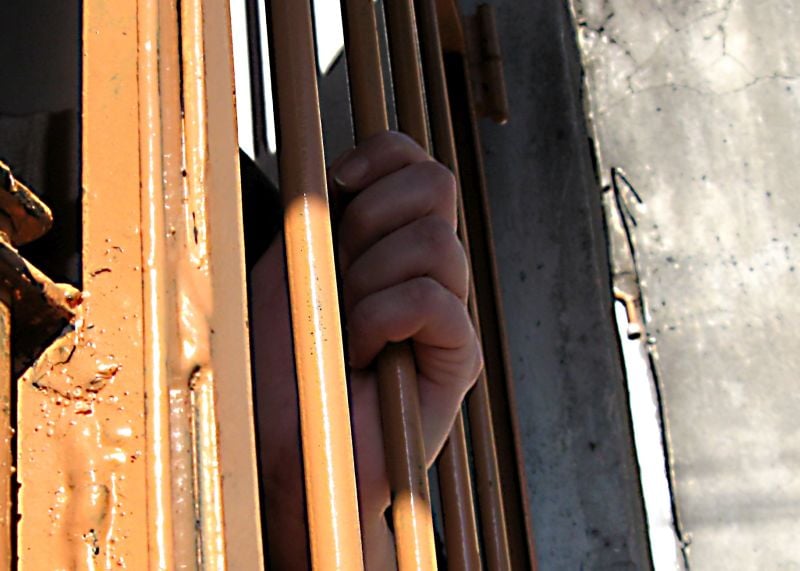
Recently, I had a chance to follow through on a Holy Spirit nudge when I was invited to have lunch at our county jail. We would hear a presentation about Jail Chaplains, eat the same lunch the inmates would be served, and listen to testimonies of former and current inmates, as well as one of the leaders of the program.
It was a step I'm grateful to have taken. Just being on the premise opened my eyes, and so many thoughts began stirring. Certainly, I felt more connected to those who reside within the concrete walls of the jail as I nibbled on a very basic sandwich and slurped down corn chowder, drinking water from a Styrofoam cup.
The former and current inmates who talked with us shared a little of their life stories. Both had been introduced to Christ early in their lives, but for whatever reason, it didn't stick, as with so many young people. Each, for fairly valid reasons, became disillusioned with life, and in time, turned to a life of crime, mostly entwined with drugs.
Addiction cannot be taken out of the equation. A large majority of the incarcerated are addicts, and as we know, addiction follows other ills in one's life, not because those individuals really enjoy the taste of their drug of choice.
I found the insight of the current inmate, who came into the room in his bright-orange garb, to be particularly revealing. Before he connected with Jail Chaplains, he said, time in jail was just a pause from one high to another; just a stall. He showed up at one of the Jail Chaplains meetings because of a promise of food. But something there grabbed him, something hopeful. And after a while, he says, he began "looking at people differently," noticing things around him he hadn't seen before. It was as if his frozen soul had begun to melt. Drop by drop, something new came into view. Now, seeing college on the horizon, he is grateful to have Christ back in his life.
By the time he got done talking, I saw him not as another inmate but a boy searching for God, desperate to make a better life for himself. Rather than scary, he seemed vulnerable, and certainly, his willingness to share his story touched me. He'd been a meth baby, so from that start, it seemed, was doomed. But no more.
A sheriff's deputy who has helped with the program shared that since its incorporation, tension within the jail has decreased significantly. For when people begin to understand that they have dignity, the need to fight against the world and everyone in it lessens.
Even as I'm absorbing all of this, I've been poring through Peter Kreeft's newest book, I Burned for Your Peace: Augustine's 'Confessions' Unpacked , which has me enthralled. And I've reached the point at which St. Augustine knows Truth, but is not quite ready to go all the way.
"And here I was going on thirty, still sticking in the same mire, greedy for the enjoyment of things present though they ever eluded me and wasted my soul, and at every moment saying, 'tomorrow I shall find it.'"
Oh, the ever elusive, "I will change...tomorrow."
These thoughts and others kept Augustine restless.
"Time was passing and I delayed to turn to the Lord. From day to day I postponed life in You, but I did not postpone the death that daily I was dying in myself."
But then comes the good news; news that can help us see what might be possible.
"Augustine's dissatisfaction with his own life was a necessary preliminary to his conversion," Kreeft notes. "Someone who is totally satisfied with his life is not going to convert, or marry, or join the army."
I pause, thinking of my illumination that day in the jail. Who is in a better position to hear about Christ than one who, at least for the moment, is clear-headed, with basic needs met, yet haunted by a past that has only led to discord and fragmentation? The incarcerated are perhaps most equipped to sit down and hear the story of a God-man who can make all things new.
[Tweet "Visiting the imprisoned reminds @peacegardenmama to consider how to serve those hungry for God."]
It's taken me a while to get here, but as a friend pointed out when my children were really small, the imprisoned can be the child in the crib, or the mother feeling isolated in her own home while caring for young, needy children. There are times in our life when staying put is the best thing of all -- and sometimes, the only possible thing. But there are other times God asks more of us. He bids us to come more closely into his heart to see more fully the needs around us, and to pray on how we might serve him through serving those hungry for his love.
I don't know for sure how this will end. I'm still praying, still discerning. But I have to admit at the very least that I have been awakened. For how can I, having known the love of God, not want to bring that to others, especially those who have been denied this gift?
"...if we taste one second of contemplative joy, one 'timeless moment,' we cannot forget it," Kreeft says. "Once you have had the tiniest taste of eternity, you cannot be wholly satisfied with any other food. It is a divine gift, an appetizer of Heaven."
Q4U: We cannot all literally visit the imprisoned. But what CAN we do in our current state of life to respond to this corporal act of mercy?
Copyright 2016 Roxane Salonen
Share this article
About the Author

Roxane Salonen
Roxane B. Salonen, Fargo, North Dakota (“You betcha!”), is a wife and mother of a literal, mostly-grown handful, an award-winning children’s author and freelance writer, and a radio host, speaker, and podcaster (“ Matters of Soul Importance ”). Roxane co-authored “ What Would Monica Do? ” to bring hope to those bearing an all-too-common cross. Her diocesan column, “ Sidewalk Stories ,” shares insights from her prolife sidewalk ministry. Visit RoxaneSalonen.com
Related Blog Articles

Subscribe to Catholic Momcast on iTunes or Spotify
Catholicmom on social networks, about catholic mom.
Support CatholicMom.com
Associated Links
Holy Cross Family Ministries
Family Rosary
Family Theater Productions
Congregation of the Holy Cross
Father Patrick Peyton, C.S.C.
CatholicMom.com Book Series at Ave Maria Press The Peyton Institute for Domestic Church Life
Stay connected! Don’t miss a thing! Sign up to receive our free daily digest email.
Copyright © 2024 CatholicMom.com. All Rights Reserved.
- Share this page on Twitter Share this page on Twitter
- Share this page on Facebook Share this page on Facebook
- Share this page on LinkedIn Share this page on LinkedIn
- Email a link to this page Email a link to this page
- Prayers & Reflections
Year of Mercy: Visit the imprisoned
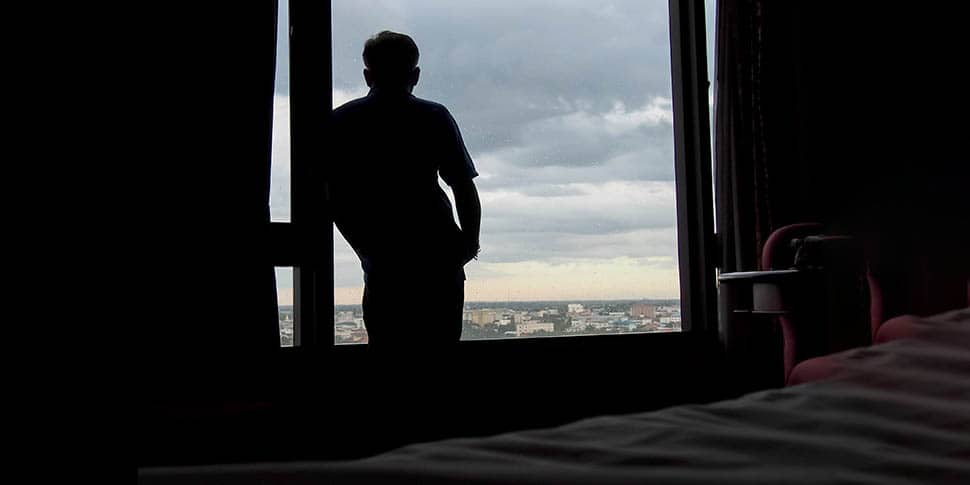
Opening Prayer
Merciful God, to whom the secrets of the heart lie open, who recognize the just and make righteous the guilty, hear our prayers for our brothers and sisters held in prison; grant that through patience and hope they may find relief in their affliction and soon return unhindered to their families. Through our Lord Jesus Christ, your Son, who lives and reigns with you in the unity of the Holy Spirit, one God, for ever and ever. Read Luke 23:33-43
Responsorial Psalm
Psalm 25:1-2, 3-4, 5-6, 7, 10-11
R. To you, O Lord, I lift up my soul, my God, in you I trust.
No one is disgraced who waits for you, but only those who are treacherous without cause. Make known to me your ways, Lord; teach me your paths. R. Guide me by your fidelity and teach me, for you are God my savior. Remember your compassion and your mercy, O Lord, for they are ages old. R. Remember no more the sins of my youth; remember me according to your mercy, because of your goodness, Lord. R. All the paths of the Lord are mercy and truth toward those who honor his covenant and decrees. For the sake of your name, Lord, pardon my guilt, though it is great.
Intercessions
For all who have influence and authority over criminal justice systems, that they use their power to establish effective rehabilitation programs for inmates, we pray: R. Lord, hear our prayer. | For the families of incarcerated people, especially children, that they receive the assistance they need to maintain a healthy and dignified life, we pray: R. Lord, hear our prayer. For all those guilty of crime, that they may be given the grace to admit every wrongdoing and the strength to follow the path of conversion, we pray: R. Lord, hear our prayer. For all who have been victims of crime, that they are able to forgive like Jesus and to labor for a world of justice and mercy, we pray: R. Lord, hear our prayer. For the entire human race, that we make the effort to rid our personal lives of evil and injustice in order to sow peace in every relationship and every encounter we have, we pray: R. Lord, hear our prayer. Our Father…
Closing Prayer
Pope Francis’ Prayer for the Jubilee Year of Mercy (excerpt) Lord Jesus Christ, you have taught us to be merciful like the Father, and have told us that whoever sees you sees Him. You are the visible face of the invisible Father, of the God who manifests his power above all by forgiveness and mercy: let the Church be your visible face in the world. Send your Spirit and consecrate every one of us with its anointing, so that the Jubilee of Mercy may be a year of grace from the Lord, and your Church, with renewed enthusiasm, may bring good news to the poor, proclaim liberty to captives and the oppressed, and restore sight to the blind. We ask this of you, Lord Jesus, with the Father and the Holy Spirit, one God for ever and ever. Amen
By Ed Lis, Catholic Social Services, Archdiocese of Philadelphia Christopher was a good student who grew up in a single parent household. Despite his mom’s best efforts to raise him right, Christopher had a brief but fateful run in with the law at age 16. His mother, Christine, remembers the phone call – Christopher had been arrested right before Mother’s Day and right after learning that his girlfriend was pregnant. He was a straight-A student, active in sports, and someone people enjoyed being around. But he got caught up in doing “crazy, stupid things” with his friends. The result: a stint at the youth detention center, where Christine had to speak with him through thick glass: “I couldn’t even hug him.” Christopher knew that he could not run from responsibility; he had to manage his life, even as things went from bad to worse. First, he was charged as an adult. Then, still detained, he heard from his mom that his older brother had been killed as an innocent bystander of neighborhood gun violence. Christine was heartbroken again. She remembers that Christopher came to the funeral in shackles. Life got more hopeful when Christopher was sent by Juvenile Court to St. Gabriel’s Hall, a program started by the De LaSalle Christian Brothers in 1898. St. Gabriel’s Hall is a residential treatment and educational facility in suburban Philadelphia which offers young men like Christopher a second chance and an opportunity to earn a high school diploma, a GED, or vocational training. At the Hall, Christopher met caring staff, including a few men of whom he says: “They were like fathers to me. If I needed help or just to talk, they were there for me. They helped me turn it around, and taught me to be patient, humble, and strong.” While at the Hall, his daughter was born. When his mom brought the child for a visit, the little girl rested peacefully on his chest. Christopher was at the Hall for 18 months and graduated with honors, receiving the leadership award. Upon discharge, Christopher began meeting weekly with Michael, his Reintegration caseworker. The visits lasted for 6 months and were meant to ensure a positive and permanent return to home and community, assisting Christopher with employment and educational goals, while fulfilling conditions of probation such as counseling. Michael was impressed with the progress Christopher made, due in large part to the ongoing support and guidance of his mother. As Michael observed, “reintegration takes the structure, discipline, and life lessons learned at the Hall and incorporates them into the young man’s life. As in this case, the results prove that it works.” Christopher now holds a full-time job, is supporting his infant daughter, and is enrolled to attend college. His story is a concrete witness to the transformative power of mercy for those who have made a mistake and are willing to learn.
Spiritual Work of Mercy
“Bear wrongs patiently” doesn’t mean being a doormat or standing idle as injustice spreads. Consider how Jesus practiced this work of mercy: when mistreated he pressed forward in fulfilling God’s will, but he also named – and challenged people to reject – evil. Instead of demanding a tooth for a tooth, Jesus “conquered evil with good” (Rom 12:21). The key is to not take slights personally. To “bear wrongs patiently” is a virtue that every disciple of Christ can develop with grace and practice.
Quote of Mercy
This time in your life can only have one purpose: to give you a hand in getting back on the right road, to give you a hand to help you rejoin society. All of us are part of that effort, all of us are invited to encourage, help and enable your rehabilitation. A rehabilitation which everyone seeks and desires: inmates and their families, correctional authorities, social and educational programs. A rehabilitation which benefits and elevates the morale of the entire community. Pope Francis, from his remarks to the detainees at Curran-From hold Correctional Facility in Philadelphia, which he visited on September 27, 2015.
Sign up to receive CCUSA’s prayers and reflections in your inbox.
Visit the Imprisoned
- skip to main content
- skip to footer
- Immigration
- Nonviolence
- Social Justice Resources
- Our Faith and Values
- Prayers and Meditation
- Spiritual Direction
- Retreat and Spiritual Centers
- Request a Prayer
- Pastoral Services
- Social Services
- Mercy Investment Services
- Ministry Stories
- Mercy Association in Scripture and Theology
- Mercy International Association
- Mercy Locations
- Stories of Mercy
Take Action
- Advocate for Social Justice
- Mercy Volunteer Corps
- Support CCASA
- Ways to Give
- Become a Sister
- Become a Mercy Associate
- Become a Companion in Mercy
- Job Opportunities
In this year’s Lenten reflection series, seven sisters offer their personal stories and insights on each of the Corporal Works of Mercy and how acts of mercy can have a profound impact on the lives of our sisters and brothers. Accompanying these reflections are line drawings by Sister Mary Clare Agnew, a contemporary of Catherine McAuley, which illustrate the Sisters of Mercy in ministry in 1830s Ireland. The reflection series also includes reflections for Ash Wednesday, Palm Sunday, Holy Thursday and Easter.
By Sister Natalie Rossi , Campus ministry, Mercyhurst University , Erie, Pennsylvania ; On staff, State Correctional Facility at Cambridge Springs , Cambridge Springs, Pennsylvania
To find the genuine in oneself is to find God.
Does one find God in prison? One could say one is overwhelmed with the Presence of God in prison.
“We see because we are seen. We love because we are loved.” ( Edward Hahnenberg )
I have worked in prison ministry for about 20 years, not all at one time. The women I see or talk with open their hearts to God. They want to be seen for who they are, a person created by God in God’s image. They have hit bottom and are reaching for something to bring them peace and healing. They are ripe for Jesus.
The hardest part is to help them believe that they are good because God dwells within them. God doesn’t leave them.
When COVID-19 hit, I was fortunate because I am under contract with the diocese to work in the prison and so could continue to go in. Volunteers could not. I offered spirituality and art. But the most important activity that I did was to visit the units and each person.
They wanted to be seen. Just that little visit brought many “thank yous.” Just letting the women know that God loves them brought so much peace.
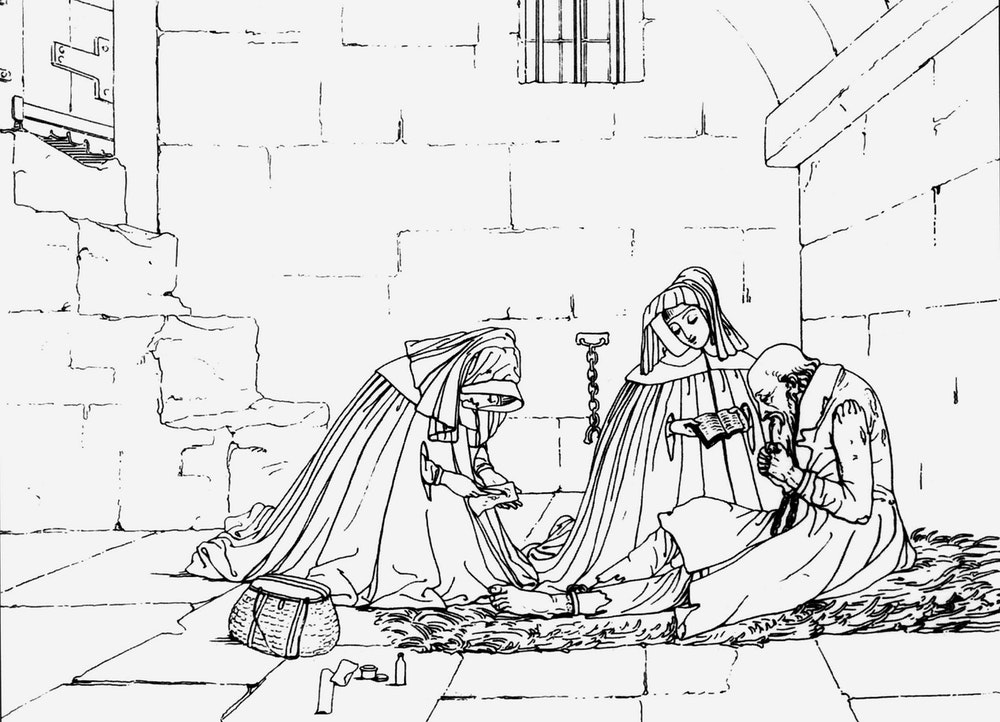
Currently, in many prisons and jails, volunteers still can’t visit. So where else can we find the imprisoned besides a state women’s prison at Cambridge Springs?
I meet them every day at Mercyhurst University. Students struggling to be OK with themselves—to find meaning in their lives—to believe that they are loved—that God is with them. You are OK because God created you in God’s image—whether a person be straight, LGBTQ+, Black, white, autistic, disabled, etc. We are all one—same DNA—all created by LOVE.
Look around at your neighbors, relatives and friends who struggle to believe in themselves. Many are imprisoned within themselves.
How do we free those who have imprisoned themselves? How do we free ourselves? The answer is love—Luke 6:27-38.
Look around and be aware this Lent. Young persons, the elderly, perhaps, all of us struggle with being accepted for who we are. So many times, persons become who they think people want them to be, and, if not, they believe they are less than.
How do we free ourselves and others from the prisons we have put ourselves in?
“Everything is filled with sacred presence.” (Psalm)
“We are not called by God to do extraordinary things, but to do ordinary things with extraordinary love.” (Jean Vanier)
Inmates are aware that they are imprisoned. This Lent, become aware of how we are imprisoned and of how many who are walking around us are also imprisoned.
This Lent , set aside quiet time to be with God. Or become aware that God is everywhere; so be aware of God in all things, especially the persons with whom you come in contact. Make it a point to greet each person with a smile. Pray especially for people you judge or don’t like. Send God’s love to them. Let God heal…or heal you to accept the person for who they are at this moment. We all possess God.
Pray during this Lent to not judge people and to forgive wrongs that have been done to you. Spend time offering the silence up as a time of love for others. It is easy to give up food for Lent, harder to give up judging and non-forgiving.
This Lent, put more tenderness into the world, and the world we live in will become a more loving place.
Everything is nothing but the expression of God’s exuberance.

- St. Anthony Messenger
Quick Questions and Answers
- Pat McCloskey, OFM

Do Catholics take seriously the corporal work of mercy to visit those in prison? Do Catholic parishes and colleges or universities have this on their radar?
First, students at law schools in some Catholic universities have participated in “innocence projects ” that have led courts to release certain prisoners who did not commit the crime for which they have been found guilty and imprisoned. Some parishes have prison ministry groups.
Second, other Catholics write to those imprisoned or else assist them in readjusting when they have served their sentence. For our March 2018 issue, Jim Auer wrote “I Was in Prison and You Wrote to Me ” about his 12 years of writing to many prisoners. That article included the URLs of groups that can link prisoners and writers outside. Anyone willing to write a prisoner but who lacks computer access can contact Inside Out Letter Ministry at PO Box 11, Cherryville, NC 28021.
Many of my friends ask me: “If Jesus has already died for my sins and paid for them, why can’t I sin now? “
I’m afraid this solution to dealing with temptation is too simple to be true. If Jesus died for the sins of the world, would it be OK if I robbed your home? Every attempted shortcut around God’s ways turns out to be a dead end. In the long run, we become whatever we choose consistently. May Jesus help all of us to grow in his grace and love.

Leave a Comment Cancel Reply
Your email address will not be published. Required fields are marked *
Save my name, email, and website in this browser for the next time I comment.
Subscribe to St. Anthony Messenger!

Our Mission
We are Franciscan Media, a sponsored ministry of the Franciscan Friars of Our Lady of Guadalupe Province . We strive to inspire a loving world that embraces the Franciscan spirit of harmony, joy, and simplicity. May our resources renew your spirit as we share God’s love in the spirit of St. Francis and St. Clare.
- Phone: (513) 241-5615
- Address: 28 W. Liberty St. Cincinnati, OH 45202
Writer’s Guidelines Privacy Policy Post a Prayer Request Donor Portal Our Mission
Recent Articles

Fierce, Motherly Fervor

Mary Calls Us Home

Appreciate God’s Majesty
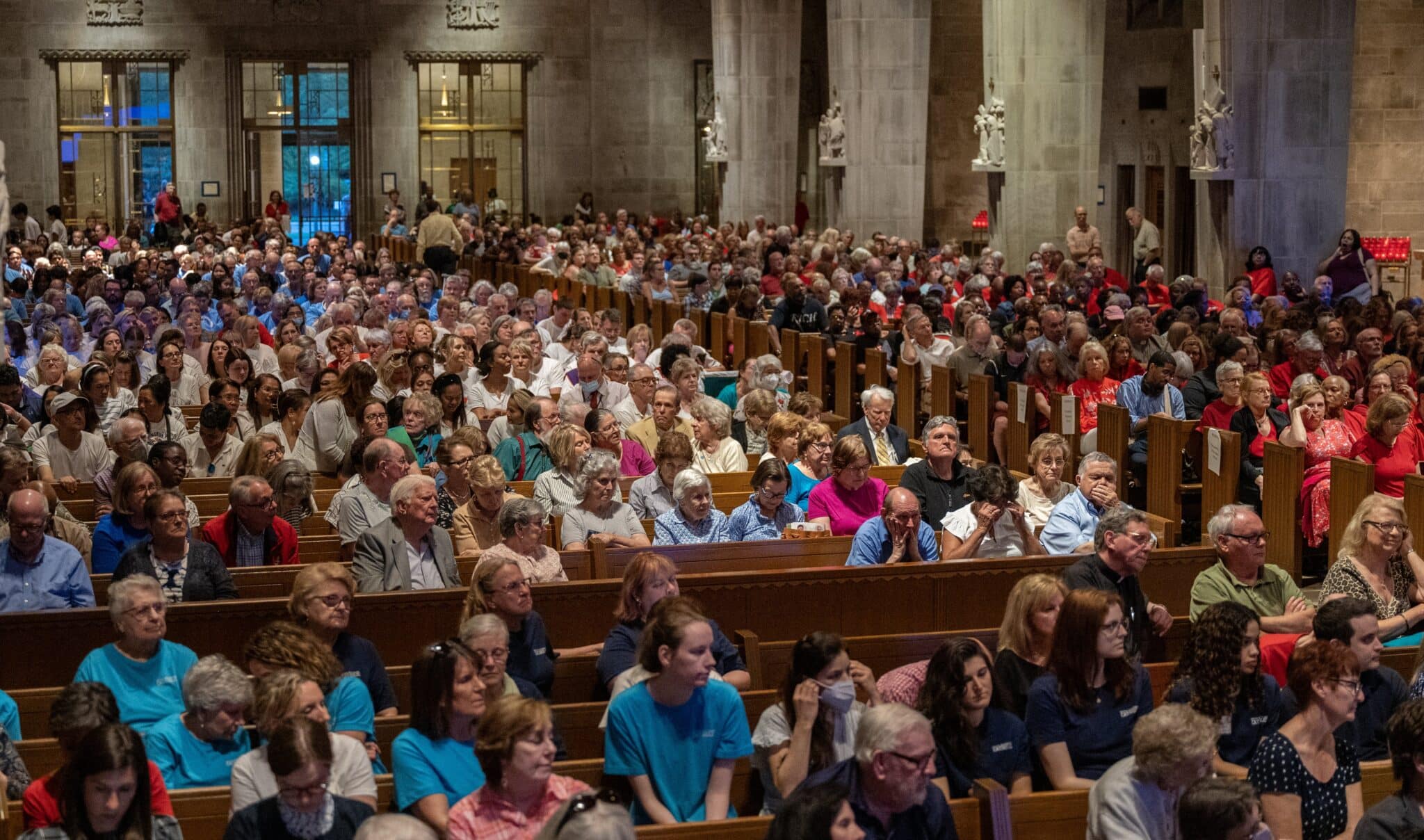
Baltimore Catholics weigh-in on ‘heart-wrenching’ proposed changes in archdiocese

I Only Need You, Lord
To Visit the Imprisoned
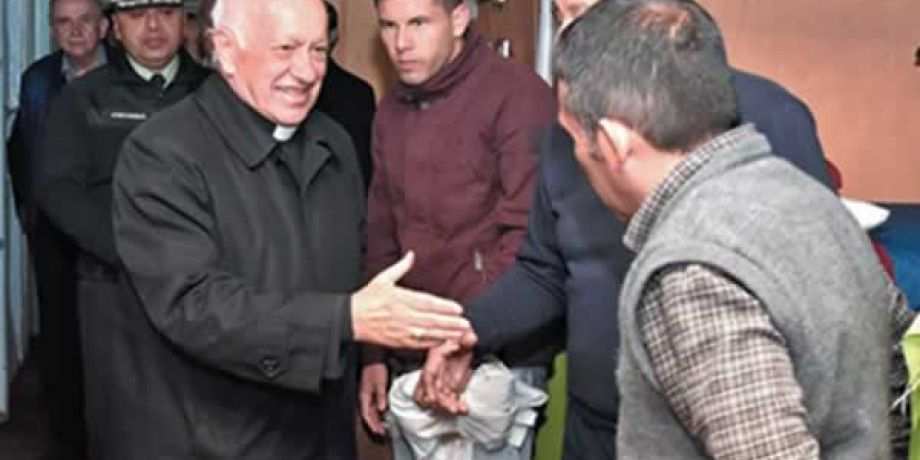
Celebrating the Year of Mercy
Fr. Michael J. Hoban
Pope Francis continually reminds us that the Church is missionary and is called to reach out to the poor, to sinners, to unbelievers and to those who live on the margins of modern society. In 2016 Pope Francis called the Church to celebrate a Year of Mercy and to discover once again the importance of the spiritual and corporal works of mercy. The Jubilee Year of Mercy was a unique opportunity for the Church in Chile to be missionary and to reach out to those who feel that there is no place for them in society.
The Archdiocese of Santiago is divided into seven territorial vicariates. The most recent vicariate to be established in the Archdiocese of Santiago is the Vicaria del Maipo (Maipo Vicariate) where I am privileged to be the Episcopal Vicar. Our Vicariate is located on the southern outskirts of the sprawling city of Santiago and includes two very different municipalities: Puente Alto (the most populated municipality in the country) and San José del Maipo (a rural municipality nestled in a canyon of the Andes Mountains). Our Archbishop, Cardinal Ricardo Ezzati invited each Vicariate of the Archdiocese to emphasize one of the corporal works of mercy and to implement that particular work of mercy in a special way. The priests, Sisters, deacons and lay pastoral agents of the Vicariate of Maipo decided that we were called to live out the corporal work of mercy: to visit the imprisoned.
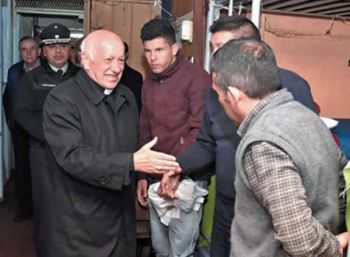
We based our decision on the fact that Puente Alto has a prison with 1300 male inmates. It was built to house 700 inmates. With nearly double the number of inmates for which the prison was designed, the men are condemned to live in overcrowded conditions in large dormitories with bunk beds. Each bunk bed has mattresses for three men. The man on the top can touch the ceiling with his nose! The food rations provided by the prison authorities leave a lot to be desired, and so the inmates rely on their families to bring them food which they cook and share among themselves. Many of the inmates come from the Columban parishes of San Matías and Santo Tomás.
When I returned to the Maipo Vicariate after four years as the Episcopal Vicar of the Southern Zone, I brought with me a frightening memory. On December 8, 2010, the feast of the Immaculate Conception, there was a fire in the San Miguel prison and 81 inmates were burnt to death. It was caused by a fight among the inmates. Some of the prisoners had built a flame thrower using the gas canisters of their little kitchen. The flames ignited mattresses. The fire was so intense that the gates of the prison cell could not be opened. I went to the prison and spent the day consoling families who had lost their sons, husbands or brothers to the fire. I went with Cardinal Francisco Javier Errazuriz to the area of the prison where the charred bodies of the dead prisoners were being kept. Cardinal Errazuriz prayed for the dead and blessed the bodies of the victims of the fire. After that experience, I could not ignore any longer the plight of the men and women who are deprived of their liberty for the crimes which they committed. As Pope Francis teaches us, no matter what sins we may commit we are never excluded from the love or the mercy of God.
Not long after returning, I visited the prison in Puente Alto. I discovered that a small group of Catholics were visiting the prison every Wednesday. I met with them and we began to explore ways of increasing the number of pastoral agents for this apostolate. Then the merciful Lord sent us a great blessing. A new chaplain was appointed to the prison, Fr. Armando. Padre Armando is a native of Iquique in northern Chile, and in his youth he participated actively in the Columban parish of Espíritu Santo. Fr. Armando proudly claims that he owes his vocation to Columban Father Hugh McGonagle who accompanied him in his discernment about the priesthood while he was in the seminary and in his early years as a priest.
Together with Fr. Armando, the Vicariate of Maipo organized workshops and courses on prison apostolate increasing the number of lay pastoral visitors from seven to 30. The increase in volunteers has meant that four days a week Catholic prisoners can avail of spiritual accompaniment and prayer. When Fr. Armando arrived in Puente Alto, the small Catholic chapel was in deplorable condition. The Maipo Vicariate made a commitment to raise funds to repair and renovate the prison chapel. So far we have raised more than $600,000 pesos (around $850.00 U.S.) for the renovation. On August 12, 2016, Cardinal Ricardo Ezzati visited the prison and celebrated the Eucharist for the prisoners. He also blessed the chapel's new tabernacle which was donated by the Apostolic Works of Ennis, Co. Clare in Ireland. Cardinal Ezzati called on the inmates not to lose heart nor lose the faith: "I want to encourage each one of you to develop all your abilities so that you can become new men, so that you can live happily with your families. Believe firmly that God can give you that possibility."
During the same month of August, we organized a campaign in our parishes to donate toiletries for personal use: toothpaste, toothbrushes, soap, toilet paper, shampoo etc. In all our parishes there was a generous response. I joked with Fr. Armando that his inmates have the cleanest hair and the whitest teeth in Chile!
In September, a religious sister of St. Ann, Sister Maria Luz Treupil, came to our Vicariate to work in prison ministry. She had spent many years in this ministry in the prison of the northern city of Antofagasta. While she was there, she began a choir and taught some of the younger inmates to play the guitar. Eventually, they produced a CD. Sr. Maria Luz hopes to repeat that experience in Puente Alto. On December 19, we organized a Christmas party for the inmates who regularly attend Mass together with members of their families. Finally, for the first time ever in the pastoral life of our Vicariate, the Summer School for the Laity will offer two courses in the prison for the men.
As the Jubilee Year of Mercy came to an end, Pope Francis wrote a Pastoral Letter, "Misericordia et Miseria." There is no doubt that prisons are necessary in society but we also need to remember: "No law or precept can prevent God from once more embracing the son (daughter) who returns to him, admitting that he has done wrong but intending to start his (her) life anew." ("Misericordia et Miseria" no.11)
Columban Fr. Michael J. Hoban lives and works in Santiago, Chile.
Creighton U. Home Page | Creighton's Online Ministries Home Page | Praying Ordinary Time Home Page
Rediscovering the Corporal Works of Mercy Home Page
Sober Catholic
Catholicism, recovery, sobriety, conversion, prayer, fasting, repentance, penance, visit the imprisoned.
Matthew 25:36 : “…in prison and you visited me.’”
“Imprisoned” can mean many things. It may oftentimes mean the literal imprisonment of those who have committed crimes. “You do the crime, you do the time.” And so people regard with indifference or contempt those who are in jail.
While by no means suggesting that those in prison do not deserve their punishment, many in jail have repented of their crimes and corresponding sins. The intransigent and unrepentant, well, their place is deserved. But for those who have come to terms with the reality of what they did and why they are in prison, their spiritual needs must be met. There are plenty of opportunities for people in communities all over to visit those in prison and minister to them. Participate in a prayer group or Bible or Catechism Study. Whatever, just show them that there are people on the “outside” who haven’t forgotten them. One good organization is “Kairos Prison Ministry International” :
There are other forms of imprisonment. Addiction is a prime example and perhaps the reason why you are reading this blog.
I wrote a poem, it was triggered by an old AA friend from my old hometown who was picked up for DWI for the umteenth time:
Alone in Jail
I sit in the cell, trapped.
Trapped in the prison of my mind.
I wish to scream “Let me out!”
But the mind has no voice, silenced by shame.
My prison, and I am my jailer, and I have lost the key.
Perhaps you can be the key to let the prisoner of addiction out of their jail cell. Reach out and extend help. If they take the help, follow through! If they reject it, wait and offer it again when they are ready.
Although it may not seem like it, another way for people to be imprisoned is overt attraction to the things of “the world.” Be it money, power, lust, fine clothes and an outward appearance (at the expense of the inward appearance), such things imprison you as they get in the way of your true self. They are hardly satisfying. Do they help you in your relationship with God?
If you click on the image below, you’ll be taken to the “Works of Mercy” store at Artist4God (my wife’s online shop.) Buy anything from the “Works of Mercy” store and a portion of the proceeds go to life-affirming charities.

Are you a creative Catholic? "The Catholicpunk Manifesto" is my new book exhorting Catholics to apply their faith to change the culture for the better!
Know someone, perhaps yourself, who might like Catholic devotionals for alcoholics? Please take a look at my books! "The Stations of the Cross for Alcoholics" and "The Recovery Rosary: Reflections for Alcoholics and Addicts" (Thank you!!)
Share this:
- Font Family Default Arial Verdana Helvetica Tahoma Georgia Times New Roman
- Font Size Default 1.0 1.2 1.5 2
Matthew 25:36
What does matthew 25:36 mean.

Visit the Imprisoned
I like to talk about Our Lord’s confinement to the tabernacle with my children – His choice out of love for us – His imprisonment though we are the sinners – when we spend time in adoration we are indeed visiting the imprisoned – our dear sweet prisoner of Love. Cathy, mom of 5, Carroll, Ohio .
I pick up three sweet ladies from the local retirement home on the 1st Friday of each month and take them to Eucharistic Exposition. They would not be able to leave on their own. The kids come with me when they are not in school and this is a great experience for all! – Jody, mom of 3, Dublin, Ohio****
****note from Michele & Emily – this is one of those superstar works of mercy – they visit the sick, comfort the sorrowful/lonely, pray for the living and the dead and visit those imprisoned (in the nursing home) as well as Jesus confined in the tabernacle as Cathy explained above!
I’m the first to admit I’m a little hesitant to walk into a prison. But there are still ways we can reach out to the imprisoned so that they know they’re not alone. For example, in our city, a local parish collects reading material for prison inmates. You can take your Catholic Times, National Catholic Register, Our Sunday Visitor, This Rock, and other Catholic publications there once you are done with them. – Peggy, mom of one, Columbus, Ohio
My husband’s coworker once called me at the house during their workday to check on a story my husband had been sharing. He asked me where my husband and I met. I responded, “In jail.” As he was hanging up, I heard him tell his other co-workers,”He was telling the truth.” LOL. What I failed to tell him (because I knew my husband was having a little fun) was that we were in prison ministry at the same time. There were only 3 of us at the time and we grew close. We offered bible studies for the men at the detention centre awaiting their trials. Some weeks we had no inmates join us and we would go out for coffee and a doughnut. Other weeks we would have some inmates come out and listen to the word of God and share some of their stories with us. It gave us an opportunity to pray with them. And it makes for a great meeting story 🙂 – Melina, mom of 11, Ontario, Canada
We would love to hear how you live out the Circle Of Mercy.
Share your story here .
Recent posts.


- Mi’kmaw Parishes
- Paroisses acadiennes
- Mass for Shut-ins
- “We are each one feather”
- Donate to the Indigenous Reconciliation Fund
- Offices and Ministries
- Financial Statements
- Parish Reporting
- Organizations
- Youth Ministry
- Responsible Ministry
- Lenten Conversation Resource 2024-Word
- Lenten Conversation Resource 2024 – PDF
- Synthesis Report October 2023
- Diocesan report to the Synod
- Daily Prayers for Clergy
- Emmaus Centre
- First Communion
- Confirmation
- Vocations to the Priesthood
- Permanent Diaconate
- Newsletters
- In Memoriam
Popular Posts

Welcome To Our New Website!
June 8, 2020

Pastoral Letters from Bishop Wayne Kirkpatrick
June 23, 2021

What Can We Learn From This Pandemic?
July 3, 2020

Pastoral Appointments 2020
August 13, 2020

Reflection on the Eucharist
June 12, 2020
- All Locations
- All Locations Copy
- Annointing of the Sick
- Becoming a Catholic
- Clergy Directory
- Communications
- Custom Listing Page
- Eremitical Life
- Find a Mass
- Holy Orders
- Mi’kmaw Parishes
- Old Organizations
- Photo Gallery
- Reconciliation
- Religious Life
- Search Home
- Single Location
- Women Religious
Visit the Imprisoned

- Faithful Family Jesus Love Prayer Uncategorized Youth
- March 18, 2021
“A single act of kindness can be the spark of light needed to keep moving forward.”
Our Lenten Journey through the Corporal Works of Mercy continues.
“ Looking back a few years, I find myself in a place and situation that I had not ever dreamed of. As a Deacon Chaplain I visit and minister to men and women in prison, to those suffering in hospitals and other institutions and this service has now become a blessing in my life. Matthew’s Gospel speaking about the Corporal Works of Mercy have become my “go to” scripture passages, and my strength. Reflecting back I realize, my mind and heart are filled with memories and experiences that have moulded me into quite a different person. This ministry has transformed me.
Yes, God is calling all of us to be transformed by giving food to the hungry, welcoming the stranger, tending to the sick, giving drink to the thirsty and yes visiting those in prison. But Jesus is speaking to these actions also in a much broader sense as well. There are many forms of imprisonment in our society even today. There are of course, those who are in prison or correctional facilities. But Jesus’ words remind us of those imprisoned when they face mental and physical abuse at home, the ones suffering from mental illness and feel imprisoned by society, those whose addictions imprison them, and the lonely who feel incarcerated in their own homes, especially during this pandemic. There are many in our midst who feel imprisoned. Just as physical bars and walls keep us locked in, fears, anxiety, depression and hopelessness are all prisons that hold us captive, keeping us from feeling the love of God. The Lord had compassion for those imprisoned by invisible walls as well as those imprisoned by real walls.
Jesus calls us to action. Our Gospel constantly calls us to journey, as a people, without the exclusion or rejection of anyone. No one is to be left behind, discarded or forgotten. Being merciful, being close to those who suffer, means getting our feet and hands dirty. And that is ok because we imitate our Lord and Saviour Jesus Christ. Being unafraid to reach out with compassion to those who are “in the muck” and whose pain and imprisonment make them cry out, we begin to live like Jesus and live in Jesus. We become gradually transformed into men and women of deeper goodness, compassion and love, builders of God’s kingdom.
In these few years of Chaplaincy ministry I have learned that those to whom we reach out are the greatest of teachers, teachers of what matters: about love and lost love, compassion and lack of compassion, loneliness, fear and the gift of companionship. During this Lenten season and especially this this week, let us partake more fully in our actions and so live our mission as Christians by taking up our cross and following Jesus. Believe me if you do this you too will be transformed as I was. May God Bless you all.”
(Deacon Lorne MacNeil, Diocese of Antigonish in Corporal Works of Mercy, Atlantic Liturgical Commission, 2021)
“There are many ways to be in prison … who rely on visits for connection to themselves and the outside world.” Our youth on visiting the imprisoned:

Each Sunday of Lent, plus Palm Sunday and Wednesday of Holy Week, we will share a reflection and video to learn of and practise the seven Corporal Works of Mercy:
Feed the Hungry Give Water to the Thirsty Clothe the Needy Shelter the Homeless Visit the Sick Visit the Imprisoned Bury the Dead
The information is based on a new resource prepared by the Atlantic Liturgical Commission, and includes submission from diocesan staff and clergy throughout the Atlantic Provinces. (Click on the image to download)
We invite you to download the resource and celebrate the prayer services at home. The music, readings, reflections and prayers are provided for you and you may wish simply to use, for example, the YouTube link for the hymn, but if you are able to sing yourselves then that is encouraged. We invite you to use these rituals in ways that work best for you and your situations. That we gather to pray and act is the most important thing.
Watch for our final posting on Palm Sunday: Bury the Dead

Jennifer Hatt
Communications Officer, Diocese of Antigonish
Email Login
Subscribe to CE (It’s free)
- CE in the News
- Apologetics & Education
- Art & Culture
- Culture of Life
- Food & Travel
- The Blessed Virgin Mary
- Marriage & Family
- Prayer & Spirituality
- Spiritual Warfare
I Was in Prison and You Visited Me
What a joyous time of the year. It is the final week of Advent and just four days away from the celebration of Christ's most holy birth. How fortunate we are to find ourselves surrounded by our brothers and sisters, loved ones and cherished friends, anticipating His coming.
In this time of joy, then, I would like to turn to a special group of our brothers and sisters, a group which does not always receive the inclusion and support that it should: those who find themselves imprisoned in correctional facilities within our diocese.
Yesterday morning, I had the privilege of celebrating Mass with residents of the Rappahannock Regional Jail near Fredericksburg. I witnessed in these men and women a deep thirst for God and hope that we all feel in our hearts.
The Lord teaches us through St. Luke's gospel that visiting the imprisoned is indeed a healing ministry: "The spirit of the Lord is upon me because he has anointed me to bring glad tidings to the poor. He has sent me to proclaim liberty to captives and recovery of sight to the blind, to let the oppressed go free, and to proclaim a year acceptable to the Lord." (Lk 4:18-19).
We know as Catholics that visiting our brothers and sisters in prison is what the Lord would do, for He loved the most vulnerable among us and we are encouraged to do the same. Many of our brothers and sisters in prison have never felt love, or have been rejected by their own family and friends, and need someone to pray for them, to stand beside them. Like St. Luke, St. Matthew also teaches us the importance of forming relationships with those who are imprisoned. He records the words of Jesus, "I was in prison and you came to me" (25:36). This sentence is brief, with such concise words — yet what a profound meaning it carries.
Those in prison are often the first to be marginalized from mainstream society. We cannot let this happen. The Lord teaches us to love the vulnerable and appreciate the dignity of each human person precisely because they are made in the image of likeness of God Himself, even as we are. They are a part of our family; they are our brothers and sisters. They are men, women and youth from our communities, our families, our churches and schools.
In the United States, there are approximately 2.3 million people currently serving sentences in a correctional facility, and they need us. There are nearly 30 prisons or correctional facilities located within and around the boundaries of our own diocese. The importance and recognition of this population has not been forgotten. Through Catholic Charities of the Diocese of Arlington, we have a specific office for Prison Ministry, directed by Sister Connie Parcasio, S.N.D.S. This vital ministry is indeed a calling. To minister to the imprisoned is to follow directly in the footsteps of our Lord. I ask the faithful of our diocese — are we aware of the tremendous needs our brothers and sisters face? Are we willing to help and love them as Christ loves us?
Members of our diocese have volunteered with Sister Connie and Catholic Charities, and have visited those in prison and ministered in various ways: visiting with them one-on-one, tutoring, sharing God's word through Bible studies, and preparing them for Masses and confessions. Some volunteers minister to those on death row, and help others seeking reentry into daily society. Often when prisoners are released, there are few transitional mentorships or relationships for them to rely upon. This is where the Church can be of great help — to be a friend to someone adjusting to daily life, both in prison and after. In our diocese, we are blessed to have many opportunities to minister to these brothers and sisters while they are incarcerated as well as when they are released. Prison Ministry likewise ministers to the victims of crime as they seek healing from their loss, to families and children of both victims and offenders.
The Prison Ministry volunteers at Catholic Charities come from varied backgrounds and different age groups and all are invited to participate: for example, retired professionals, retired military personnel, working parents, college students, grandparents, and others who feel the call to serve.
Students in our diocese play a large role in prison ministry. Last year, Sister Connie created opportunities for students in Catholic schools to write personalized Christmas cards to residents at local facilities. Many students at the University of Mary Washington and Christendom College visit and minister to those in juvenile facilities near their schools. These opportunities are not only a benefit to those in prison, but are also important to the staff at the facilities, the families and friends of the imprisoned, and also to the victims and their families.
I invite each of you, then, in the spirit of celebrating the birth of the Christ Child, Who loves each person for his or her intrinsic dignity, to pray for our brothers and sisters in prison. Pray a novena to Our Lady of Perpetual Help or gather members of our parish together for prayer services and vigils. If you feel the call to prison ministry, I encourage you to seek opportunities through your parish and Catholic Charities. Simply writing a card to a prisoner may give them more hope and ignite their faith. I saw yesterday how important forming relationships can be in the hearts of the imprisoned; to see their eyes fill with joy because others came to visit them. During this time of giving and peace, let us remember all our brothers and sisters in Christ. May God grant you and your loved ones a blessed Christmas.
By Timothy Wheeler
Subscribe to ce (it's free), more on catholic exchange.
Restoring Christian Culture: The Mission of Young Catholics
Our Response to His Command: The Sixth Sunday of Easter
Is It Really "Just" War?
Go to Catholic Exchange homepage

Adeodatus | The Renewal of Catholic Education feat. Dr. Alex Lessard

The Vocation of Consecrated Virginity | feat. Mary Beth Bracy

Modern Miracles at Lourdes | feat. Marlene Watkins
Most shared.
© Copyright 2024 Catholic Exchange. All rights reserved.
Catholic Exchange is a project of Sophia Institute Press .
Advertise on Catholic Exchange Design by Perceptions Studio .
Privacy Policy
Design by Perceptions Studio .
- Books and Art
- Catechetics
- Dating & Singles
- Faith & Spirituality
- Health & Spirituality
- Marriage & Family
- Media & Culture
- Money & Economics
- Lives of Saints
- Same Sex Attraction
- Science and Discovery
- More from M-W
- To save this word, you'll need to log in. Log In
Definition of imprison
transitive verb
- incarcerate
Examples of imprison in a Sentence
These examples are programmatically compiled from various online sources to illustrate current usage of the word 'imprison.' Any opinions expressed in the examples do not represent those of Merriam-Webster or its editors. Send us feedback about these examples.
Word History
Middle English, from Anglo-French emprisoner , from en- + prison prison
14th century, in the meaning defined above
Articles Related to imprison

Is It 'jail' or 'prison'?
How they differ and overlap
Dictionary Entries Near imprison
imprisonable
Cite this Entry
“Imprison.” Merriam-Webster.com Dictionary , Merriam-Webster, https://www.merriam-webster.com/dictionary/imprison. Accessed 4 May. 2024.
Kids Definition
Kids definition of imprison, legal definition, legal definition of imprison, more from merriam-webster on imprison.
Nglish: Translation of imprison for Spanish Speakers
Britannica English: Translation of imprison for Arabic Speakers
Subscribe to America's largest dictionary and get thousands more definitions and advanced search—ad free!

Can you solve 4 words at once?
Word of the day.
See Definitions and Examples »
Get Word of the Day daily email!
Popular in Grammar & Usage
More commonly misspelled words, commonly misspelled words, how to use em dashes (—), en dashes (–) , and hyphens (-), absent letters that are heard anyway, how to use accents and diacritical marks, popular in wordplay, 12 star wars words, the words of the week - may 3, 9 superb owl words, 10 words for lesser-known games and sports, your favorite band is in the dictionary, games & quizzes.


COMMENTS
To visit the imprisoned is a corporal work of mercy. Jesus mentioned it specifically when he said, "For I was . . . in prison and you visited me" (Mt 25:35, 36). Jesus has mercy for "the least," those despised by others. Convicts rank high among "the least." For the general public, when a criminal gets prison time, the criminal is ...
The fifth Corporal Work of Mercy is "Visit the Imprisoned." This work of mercy is important, and often neglected. When I was in college, I had the privilege of being involved in the Legion of Mary, a Catholic lay apostolate that began in Ireland, that involves a commitment of two hours of apostolic work done each week, always with a partner (which is great, so that you are never alone on ...
According to a 2012 Pew Forum Survey of U.S. prison chaplains, prisons are a "bustle of religious activity.". Seventy-four percent say attempts by inmates to convert or proselytize other ...
Instructing, advising, consoling, comforting are spiritual works of mercy, as are forgiving and bearing wrongs patiently. The corporal works of mercy consist especially in feeding the hungry, sheltering the homeless, clothing the naked, visiting the sick and imprisoned, and burying the dead. ^ a b Delany, Joseph.
visit the prisoners. People in prison are still people, made in the image and likeness of God. No matter what someone has done, they deserve the opportunity to hear the Word of God and find the Truth of the message of Christ. See if your parish, or a nearby parish, has a prison ministry and if so, get involved.
Visit the sick Visit the imprisoned Bury the dead. Step 3 - Explanation: This step will address a specific Work of Mercy. This Month: Visit the Imprisoned. All of the Works of Mercy boil down to this: "Beloved, if God so loved us, we also must love one another. (1 Jn 4:11)" The Works of Mercy provide ways in which we can love better. The ...
The following is part 9 of a 14-part series to help inspire parish cenacle and study groups who are looking for ways to make a difference in this troubled world. We invite you to view the entire series. Let us now sum up the pattern of life to which our Lord is calling us. Centered on the Merciful Heart of Jesus, whose love is poured into our hearts especially through prayer and the Eucharist ...
Philip Kosloski Blogs January 11, 2016. The next corporal work of mercy includes two separate acts: "ransoming the captive" and "visiting the imprisoned.". For the purposes of this article ...
Published: April 30, 2016. By Marge Fenelon. Catholic News Service. CNS / Paul Haring. Pope Francis blesses a prisoner as he visits the Curran-Fromhold Correctional Facility in Philadelphia Sept. 27, 2015. Visiting the imprisoned is perhaps the most challenging among the works of mercy. During this Year of Mercy instituted by Pope Francis, we ...
jail or prison and the need for training in how to minister to the imprisoned. Respecting human dignity may dictate that you don't, personally, visit those in prison. Find out who in your area is visiting prisoners. Ask how you can provide support or get involved. Above all, pray for those in prison. Don't limit your imagination.
Like all the works of mercy, there are many ways to put visiting the imprisoned into action. Here are just a few: Visit someone in prison. Numerous organizations coordinate relationships between volunteers and people behind bars. Pen America and Prison Fellowship are two examples, but a quick Google search will uncover other nonprofits in your ...
To Visit the Imprisoned. It's a corporal work of mercy that, so often in my life, I've opted to sort of skirt around. I'm a mother, after all, and this means vigilance when it comes to my family. And so the thought of visiting the imprisoned has seemed something to avoid. And yet, lately, God has very directly been tapping me.
Send your Spirit and consecrate every one of us with its anointing, so that the Jubilee of Mercy may be a year of grace from the Lord, and your Church, with renewed enthusiasm, may bring good news to the poor, proclaim liberty to captives and the oppressed, and restore sight to the blind. We ask this of you, Lord Jesus, with the Father and the ...
Visit the Imprisoned. In this year's Lenten reflection series, seven sisters offer their personal stories and insights on each of the Corporal Works of Mercy and how acts of mercy can have a profound impact on the lives of our sisters and brothers. Accompanying these reflections are line drawings by Sister Mary Clare Agnew, a contemporary of ...
Do Catholics take seriously the corporal work of mercy to visit those in prison? Do Catholic parishes and colleges or universities have this on their radar? First, students at law schools in some Catholic universities have participated in "innocence projects " that have led courts to release certain prisoners who did not commit the crime for which they have been found guilty and imprisoned.
The priests, Sisters, deacons and lay pastoral agents of the Vicariate of Maipo decided that we were called to live out the corporal work of mercy: to visit the imprisoned. Visitation at the overcrowded prison. We based our decision on the fact that Puente Alto has a prison with 1300 male inmates. It was built to house 700 inmates.
Ransom the Captive/Visit the Imprisoned. "I was in prison, and you visited me.". Matthew 25:36. Prison can seem like a remote place not connected with our real lives until we learn about someone's son, daughter or other family member who is behind bars. No matter where we live or how much we earn, we probably know someone with a family ...
Visit the Imprisoned. Posted by paulcoholic on 22 January 2013, 3:47 pm. Matthew 25:36: "…in prison and you visited me.'". "Imprisoned" can mean many things. It may oftentimes mean the literal imprisonment of those who have committed crimes. "You do the crime, you do the time.". And so people regard with indifference or contempt ...
Matthew 25:36. ESV I was naked and you clothed me, I was sick and you visited me, I was in prison and you came to me.'. NIV I needed clothes and you clothed me, I was sick and you looked after me, I was in prison and you came to visit me.'. NASB naked, and you clothed Me; I was sick, and you visited Me; I was in prison, and you came to Me.'.
Visit the Imprisoned. I like to talk about Our Lord's confinement to the tabernacle with my children - His choice out of love for us - His imprisonment though we are the sinners - when we spend time in adoration we are indeed visiting the imprisoned - our dear sweet prisoner of Love. Cathy, mom of 5, Carroll, Ohio.
Visit the Sick Visit the Imprisoned Bury the Dead. The information is based on a new resource prepared by the Atlantic Liturgical Commission, and includes submission from diocesan staff and clergy throughout the Atlantic Provinces. (Click on the image to download) We invite you to download the resource and celebrate the prayer services at home.
He records the words of Jesus, "I was in prison and you came to me" (25:36). This sentence is brief, with such concise words — yet what a profound meaning it carries. Those in prison are often the first to be marginalized from mainstream society. We cannot let this happen. The Lord teaches us to love the vulnerable and appreciate the dignity ...
The meaning of IMPRISON is to put in or as if in prison : confine. How to use imprison in a sentence. to put in or as if in prison : confine… See the full definition ... Lyle and Erik were imprisoned separately, with Lyle in Mule Creek State Prison in Ione, California, and Erik about 500 miles away at Richard J. Donovan Correctional Facility ...